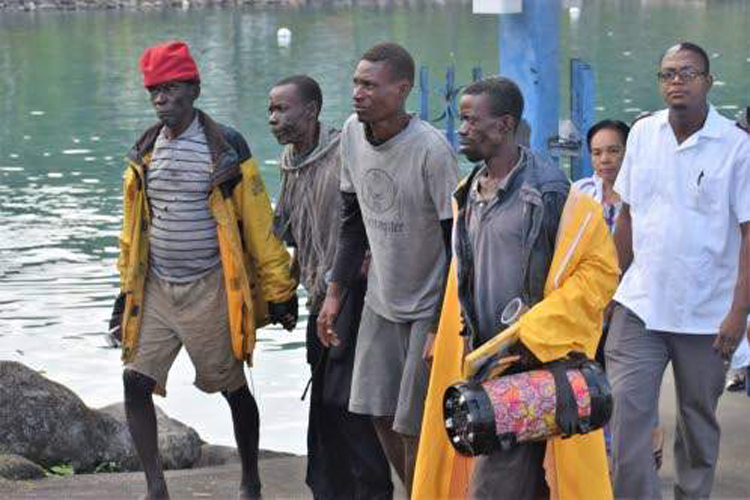(Jamaica Observer) When four Haitian men — supposedly stranded at sea for just over two weeks — were yesterday rescued by Jamaican fishermen in Portland, it took the French-speaking skills of one civilian, who happened to be on the spot, for the police to be able to decipher what the men were saying.
An early morning jaunt by Jamaican jeweller Andy Golding to search for driftwood, copper, beach stones, and sea glass to continue her jewellery craft landed her at the centre of another haul which was far more than she had intended.

The men were rescued after their small vessel carrying rotting fish and fishing gear drifted into the waters of St Margaret’s Bay, Portland. Proactive fisherfolk took the Haitians to land and handed them over to the police for interrogation, which was a slow and frustrating task until Golding — who had witnessed the entire affair and is fluent in French — was drafted into translating for them.
As told by the men to Golding, the natives of Jérémie (a town in south-west Haiti) had been at sea for 16 days drifting aimlessly after developing engine problems and running out of fuel.
“They seemed frightened; it was pretty rough out there. I am very happy they got off the boat because they were in serious distress,” Golding, who is also an environmentalist, told the Jamaica Observer. Golding — who was born in Jamaica but migrated to Montreal, Canada, as a child and spoke French as her first language — said the men, after realising she understood them, “seemed relieved” and began to share their ordeal, with one of them indicating that he was feeling unwell.
Yesterday, Deputy Superintendent of Police Dahlia Garrick, who is in charge of the constabulary’s Corporate Communications Unit, said the issue of police officers being equipped to deal with challenges posed by language barriers is one the force is addressing.
“We do have persons fluent in Mandarin (the most widely spoken form of Chinese) and Spanish. There are individuals, in fact, who recently graduated from a training course with competencies in level 1 and level 2 Mandarin,” DSP Garrick said, noting that “from time to time we make arrests and we have Jamaica Constabulary Force members who are fluent in Spanish who have had to serve as interpreters during the court case”.
“They assist in the interview process and so on. Sometimes there are cases where persons have speech challenges, we get assistance from persons versed in the area. But, for example, where persons are mute and cannot speak, we have persons who are able to sign. In cases we go to the training institutions for individuals who can help us to interpret. We are equipped to treat with issues like that and where we fall short we partner with other agencies,” Garrick told the Observer.
Asked why Mandarin and not French, since Haiti is a neighbouring country and there have been numerous instances of Haitians arriving on Jamaica’s shores via boat, DSP Garrick said, “We have a large Chinese community that we serve, and just like any other community we serve we want to ensure that we are equipped to treat with reports, to be able to interact. We have had partnerships with other countries, and this is just one example of a partnership that we have had to equip our police to serve at different levels.”
In the meantime, she said the particular language challenge can be surmounted in other ways.
“Wherever we have deficiencies we would use the high commissions or embassies to assist in that process… sometimes because of the immediacy it would be critical to have [someone there who can get the initial contact started like, for example, Golding], but after that there would be other formal processes in which you can get the type of assistance to ensure that the language is not a barrier,” she told the Observer.
The JCF, in 2018, said equipping its members to speak Mandarin was part of a strategic plan to create multilingual officers able to carry out their duties under circumstances that otherwise would require outside help. It said multilingual members of the JCF will be in a position to serve as interpreters in court proceedings, where language is a barrier to effective communication, as well as to make the police service more marketable.
In 2016, a total of 63 JCF members completed a 10-month intensive Mandarin level one course at the National Police College of Jamaica. The course was a collaboration between the People’s Republic of China and the JCF and saw members of the JCF learning basic Mandarin and being exposed to aspects of Chinese culture.






